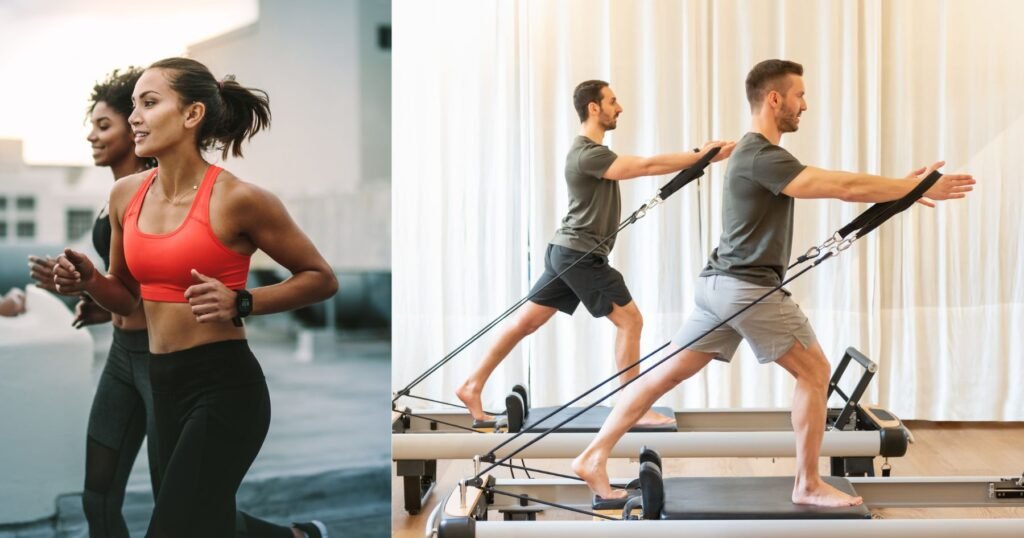Physical fitness refers to the body’s ability to function efficiently and effectively throughout daily activities without undue fatigue or injury risk. It requires optimizing cardio endurance, muscle strength, flexibility, balance, coordination, and other parameters through exercise, nutrition, and lifestyle habits.
Read More: Rebel Wilson Inspiring Weight Loss

Elements of Physical Fitness
The key components of overall physical fitness are:
- Cardiovascular endurance – The heart, lungs, and circulatory system’s capacity to supply oxygen during sustained activity.
- Muscular strength – The maximum force generated by contracting muscles. Important for power and joint integrity.
- Muscular endurance – The ability of muscles to exert force repetitively over time without fatigue.
- Flexibility – The range of motion available at joints and length of muscles. Allows fluid movement.
- Agility – Quickness and control in changing body positions and directions. Enables nimble movements.
- Balance – Maintaining equilibrium during dynamic activities and static stances. Prevents falls.
- Coordination – Smoothly executing complex motor tasks and movement sequences. Involves timing, spatial awareness, proprioception, etc.
Assessing Fitness Levels
Metrics like VO2 max, sit and reach score, push-ups completed, and agility drill times help quantify fitness in each parameter. Comparisons to norms for factors like age and gender provide context on relative fitness. Questionnaires can also subjectively gauge activity levels and abilities.

Improving Physical Fitness
Strategies to boost all aspects of fitness include:
- Aerobic exercise – Jogging, cycling, swimming, dancing, etc. Target 3-5 times a week.
- Resistance training – Bodyweight squats, planks, lunges, push-ups plus weights or bands. 2-3 times a week.
- Flexibility training – Yoga, Pilates, static stretching after warming up. Aim for daily.
- Balance exercises – Tai chi, single leg stands, use balance board. 10-15 mins daily.
- Agility drills – Ladder footwork, cone courses, reaction ball. 2-3 times a week.
- Eating nutritious whole foods high in protein, antioxidants, healthy fats, and fiber. Stay hydrated.
- Getting sufficient quality sleep to allow muscle recovery.
- Managing stress levels through techniques like meditation, nature exposure, socializing.
A personalized exercise program focused on specific goals maximizes outcomes. Consistency is key for fitness gains.
Physical Fitness
Maintaining physical wellbeing and excellent health is what is meant by fitness. Strength, endurance, flexibility, and body composition are all aspects of fitness. Cardiovascular endurance, muscle strength, flexibility, speed, and body composition are frequently used to gauge one’s level of physical fitness. Keeping fit is crucial to leading a healthy lifestyle. This item is the ideal fitness accessory for the time-constrained person. With its distinctive belt design and removable weight plates, it is made with the exercise enthusiast in mind. You may attain your goals and maintain motivation by using this gadget.
Conclusion
Physical fitness provides multifaceted benefits for health, wellbeing, appearance, athletic performance, and longevity. A foundation of cardio endurance plus balanced strength, flexibility, balance, and coordination training tailored to individual needs yields optimal and lasting fitness. Patience, dedication, proper nutrition, and rest allow the body to become physically fit.
Read More: Physical Fitness

Relevant FAQs:
Q: How often per week should someone exercise for general fitness?
A: For general fitness, aim for 150 minutes of moderate exercise or 75 minutes of vigorous exercise per week, plus resistance training 2 times per week.
Q: Does physical fitness help mental health?
A: Yes, physical activity releases endorphins and other neurotransmitters that boost mood, reduce anxiety and depression, and enhance cognitive function.
Q: Is flexibility or strength more important?
A: Both flexibility and strength are crucial components of overall fitness and should be trained in tandem.
Q: Can you be overweight and physically fit?
A: It’s possible to be overweight yet maintain good aerobic endurance, strength, etc. But excess fat can hinder performance at high levels.
Q: How long does it take to become physically fit?
A: It takes around 3-6 months of consistent exercise to develop a baseline of cardiovascular fitness and strength. Further gains require ongoing training.






